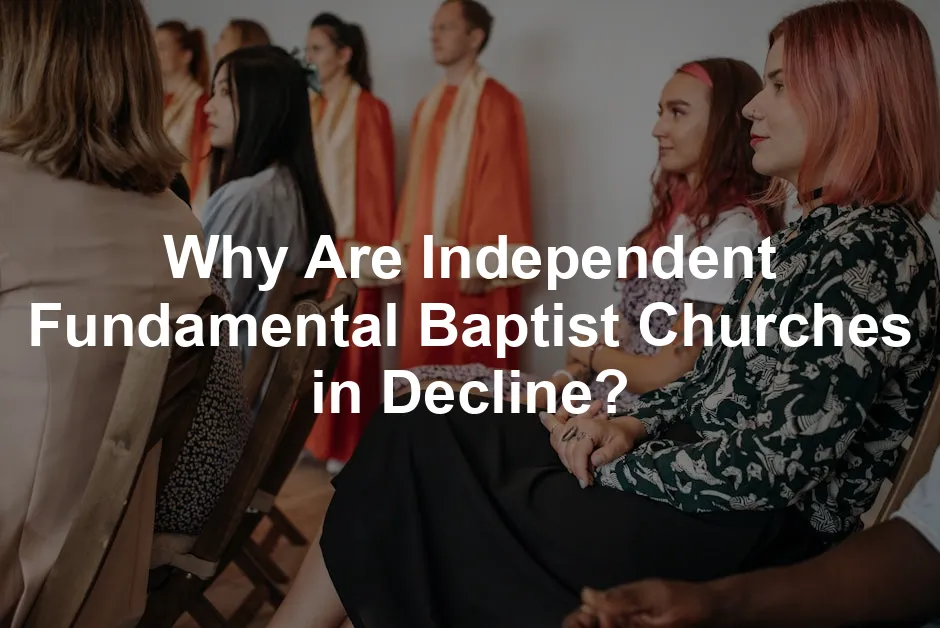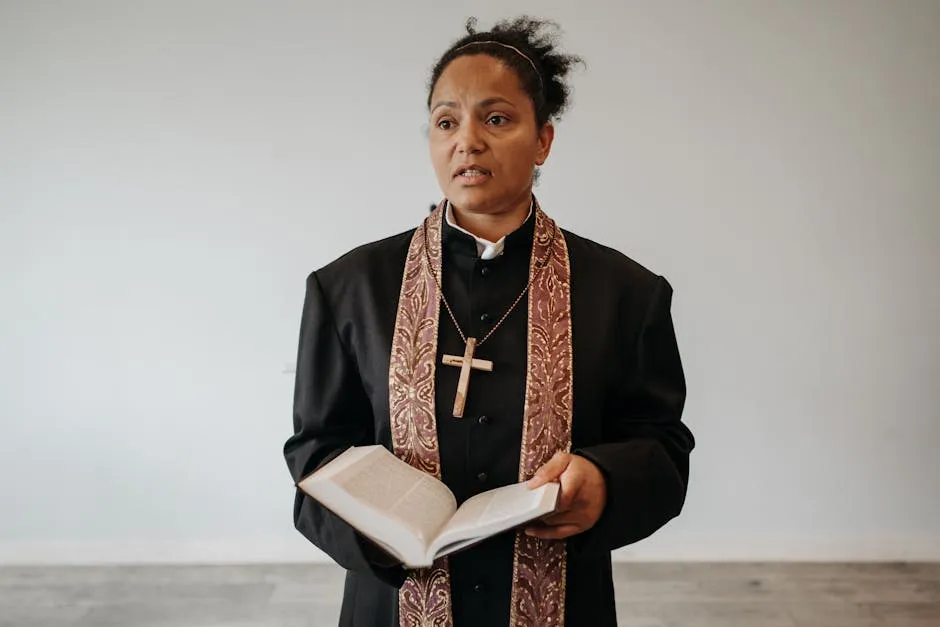
Why Are Independent Fundamental Baptist Churches in Decline?
Introduction
Independent Fundamental Baptist (IFB) churches have a rich history rooted in conservative beliefs. These churches gained prominence in response to modernism and liberal theology in earlier centuries. However, today, many IFB congregations face a troubling trend of decline. Understanding the reasons behind this decline is crucial for those invested in the future of these churches.
The decline of IFB churches is a complex issue that reflects broader societal changes. Why are independent fundamental baptist churches in decline?
Historical Context of the IFB Movement
Origins and Development
The IFB movement traces its roots back to churches that separated from larger denominational bodies due to modernist influences. Key figures like J. Frank Norris and institutions like the Baptist Bible Fellowship played significant roles in shaping the movement. This split marked a commitment to uphold traditional Baptist doctrines, resisting changes many felt compromised the faith.
Core Beliefs and Distinctives
Central to IFB doctrine is the belief in biblical inerrancy, asserting that the Bible is without error in all its teachings. Many IFB churches also adhere to King James Version-onlyism, believing this translation is the most accurate representation of God’s word. For those looking to dive deeper into the scriptures, The Holy Bible: King James Version is a must-have for your collection.

Cultural and Societal Changes
Shifts in Religious Landscape
In recent years, many people have shifted away from organized religion. Secularism is on the rise, encouraging individuals to seek meaning outside traditional faith structures. This change has led to declining religious adherence, including Independent Fundamental Baptist (IFB) churches.
Moreover, the growing acceptance of pluralism allows for diverse beliefs to coexist. As a result, younger generations may not feel the same urgency to affiliate with one particular faith.
Social media and digital communication have transformed how people engage with religion. Many now turn to online platforms for spiritual guidance or community. This shift can lead to decreased in-person attendance at churches, particularly among younger members. When church activities are just a click away, the motivation to attend services wanes.

Changing Attitudes Toward Authority
Another factor contributing to the decline in IFB churches is the changing attitude toward authority. Many individuals no longer exhibit the same deference to church leaders, especially pastors. This shift can be attributed to increased access to diverse theological perspectives through the internet.
With countless resources available, congregants are more informed than ever before. They seek answers that resonate with their personal beliefs, which can challenge traditional church authority. If you’re navigating these changes, consider reading Leadership and Self-Deception: Getting Out of the Box to gain insights on fostering healthy leadership.
This shift can create tension within congregations. Members may question their leaders or even leave when they feel their beliefs are not aligned. As the trust in authority figures diminishes, so too does the commitment to the church. Addressing these cultural changes is essential for IFB churches as they navigate this complex landscape.

Scandals and Reputational Damage
Sexual Abuse Scandals
The Independent Fundamental Baptist (IFB) community has faced serious allegations of sexual abuse. Reports reveal numerous cases where abuse was not just committed, but also covered up by church leaders. This has deeply shaken the trust of members and the public alike.
When a church fails to protect its members, especially vulnerable individuals like children, it sends shockwaves through the community. Survivors often feel isolated and unheard. The fallout from these scandals has led to a decline in membership. Many people now view IFB churches with skepticism.
As these stories come to light, former members often share their painful experiences. Many express feelings of betrayal, questioning how such acts could happen within a church that professes to uphold moral values. This ongoing damage to the church’s reputation makes it challenging for congregations to attract new members. The trust that once bound many to their faith has been severely eroded.

Controversial Teachings and Practices
In addition to scandals, controversial teachings within some IFB circles have contributed to alienation. For instance, extreme views regarding gender roles and “purity culture” can create an unhealthy environment. This strict adherence to traditional gender roles often leads to feelings of oppression among women. Many feel they are not valued as equals within the church community.
Purity culture places immense pressure on individuals, particularly young women. They are often taught that their worth is tied to their modesty and behavior. This mindset can cause long-lasting emotional and psychological impacts. The focus on external appearances over internal character can alienate many who seek a more balanced approach to faith. If you’re grappling with these issues, consider reading The Purity Myth: How America’s Obsession with Virginity is Hurting Young Women for a deeper understanding.
As younger generations seek more inclusive and understanding communities, these extreme teachings can push them away. Many individuals find solace in more progressive churches that embrace diversity and equality. This shift highlights the need for IFB churches to reassess their teachings to foster an environment of acceptance and growth.

The Rise of Alternative Movements
Emergence of the New IFB Movement
The New Independent Fundamental Baptist (New IFB) movement has emerged in the past few years, presenting a different approach to the traditional IFB beliefs. Founded by Pastor Steven Anderson, this movement has gained traction, particularly among younger congregants. While they share some core beliefs, their emphasis on aggressive evangelism sets them apart from traditional IFB churches.
The New IFB’s controversial stance on social issues, such as their anti-LGBTQ rhetoric, has sparked widespread debate. These extreme views often overshadow other aspects of their faith, driving a wedge between them and more moderate congregations. If you’re curious about the broader landscape of faith, The Rise and Fall of the Independent Fundamental Baptist Movement is an insightful read.
As traditional IFB churches face declining attendance, the rise of the New IFB presents both challenges and opportunities. Some congregants may feel drawn to this new movement, while others may feel alienated by its radical views. This evolving dynamic forces traditional IFB churches to rethink their approach to retain and engage their members effectively.

Shift Toward Evangelicalism
Many former Independent Fundamental Baptist (IFB) members are now gravitating toward mainstream evangelical groups. This trend signifies a notable shift in the religious landscape. But why are people making this move?
One primary reason is the desire for a more inclusive environment. Many individuals feel that traditional IFB churches can be unwelcoming, particularly for those with differing views. In contrast, evangelical churches often promote acceptance and community. This welcoming atmosphere appeals to those seeking a sense of belonging. If you’re exploring how to cultivate that sense of community, check out The Power of Community: Building Connections in Faith.
Furthermore, many former IFB members are attracted to the innovative worship styles and modernized approaches to faith found in evangelical circles. These churches tend to embrace contemporary music and engaging sermons, making worship more relatable and enjoyable. This shift can be refreshing for individuals who have grown weary of the rigid structures of their previous congregations.
The impact of this trend on the traditional IFB landscape is significant. As membership dwindles, many IFB churches struggle to maintain their influence in local communities. This decline can lead to a loss of resources and a diminished ability to spread their message. The gap left by departing members may create a sense of urgency for IFB churches to reconsider their approaches.
In summary, the shift toward evangelicalism is reshaping the IFB landscape. Former members seek more inclusive, engaging environments that resonate with their beliefs. As this trend continues, traditional IFB churches face the challenge of adapting to retain their congregations.

Potential Paths Forward
Embracing Change
In today’s rapidly changing world, adapting is vital for survival. IFB churches must learn to balance their core beliefs with cultural shifts. This doesn’t mean abandoning their faith; rather, it involves finding ways to connect with modern audiences.
Innovative outreach strategies can help churches engage their communities. For example, hosting community events or service projects can foster connections. These activities show that the church cares, creating opportunities for deeper relationships. Emphasizing social media presence can also help reach younger generations. By sharing uplifting content online, churches can attract new members. If you’re looking for ways to enhance your outreach, consider using an Essential Oil Diffuser to create a welcoming atmosphere during events.
Community engagement efforts are equally important. IFB churches can collaborate with local organizations to address community needs. This partnership can enhance their reputation and show they are invested in the well-being of their neighbors. By embracing change, IFB churches can revitalize their congregations and foster a positive impact in their communities.

Fostering Healthy Leadership
Effective leadership is crucial for church health. Training and supporting pastors is essential to prevent burnout and ensure strong guidance. Pastors often bear the weight of their congregations’ spiritual lives. Providing resources for self-care and continuous education helps them serve effectively. If you’re looking for a practical guide, The Emotionally Healthy Church: A Strategy for a Healthy Church is a great resource.
Mentorship is another key component. Experienced leaders can guide newer pastors, sharing insights and practical advice. This relationship fosters accountability, encouraging leaders to stay true to their calling. Additionally, churches should cultivate a culture of openness, allowing leaders to share challenges and seek support.
Creating environments that prioritize healthy leadership can lead to thriving congregations. By investing in their pastors, IFB churches can promote a sustainable future. This focus on leadership will not only enhance church dynamics but also encourage congregants to engage more deeply in their faith.

FAQs
What are the main beliefs of Independent Fundamental Baptists?
Independent Fundamental Baptists (IFB) believe in biblical inerrancy and the autonomy of local churches. They emphasize strict adherence to the King James Version of the Bible. Their teachings often include a literal interpretation of scripture and a commitment to separation from secular influences.
How has the decline of IFB churches affected their communities?
The decline of IFB churches has led to reduced local outreach and diminished charity work. As these churches struggle to maintain membership, their ability to support community initiatives has also decreased. This decline can weaken the social fabric of neighborhoods that once depended on these congregations for support.
Are there any successful IFB churches today?
Yes, some IFB churches continue to thrive. For example, churches that adopt modern worship styles and engage actively with their communities often see growth. These congregations focus on outreach, relevant teaching, and fostering a welcoming environment for newcomers.
What role do scandals play in the decline of IFB churches?
Scandals, particularly related to abuse and misconduct, have severely damaged trust in IFB churches. Reports of cover-ups and lack of accountability have led many to leave. The reputation of these churches suffers as they struggle to regain credibility within their communities.
How can IFB churches revitalize their congregations?
To revitalize congregations, IFB churches should focus on community engagement and outreach. Implementing modern communication strategies and fostering a welcoming atmosphere can attract new members. Additionally, training leaders to support and mentor congregants is essential for growth.
What is the New IFB movement?
The New IFB movement, founded by Pastor Steven Anderson, emphasizes aggressive evangelism and holds controversial views on social issues. While it shares some beliefs with traditional IFB churches, it is known for its extreme rhetoric, which has alienated many.
Why is church attendance declining in general?
Declining church attendance is a trend seen across various denominations. Factors include increasing secularism, changing societal values, and shifting priorities among younger generations. Many individuals now seek spiritual fulfillment outside traditional church settings, leading to decreased participation.
Please let us know what you think about our content by leaving a comment down below!
Thank you for reading till here 🙂
All images from Pexels




